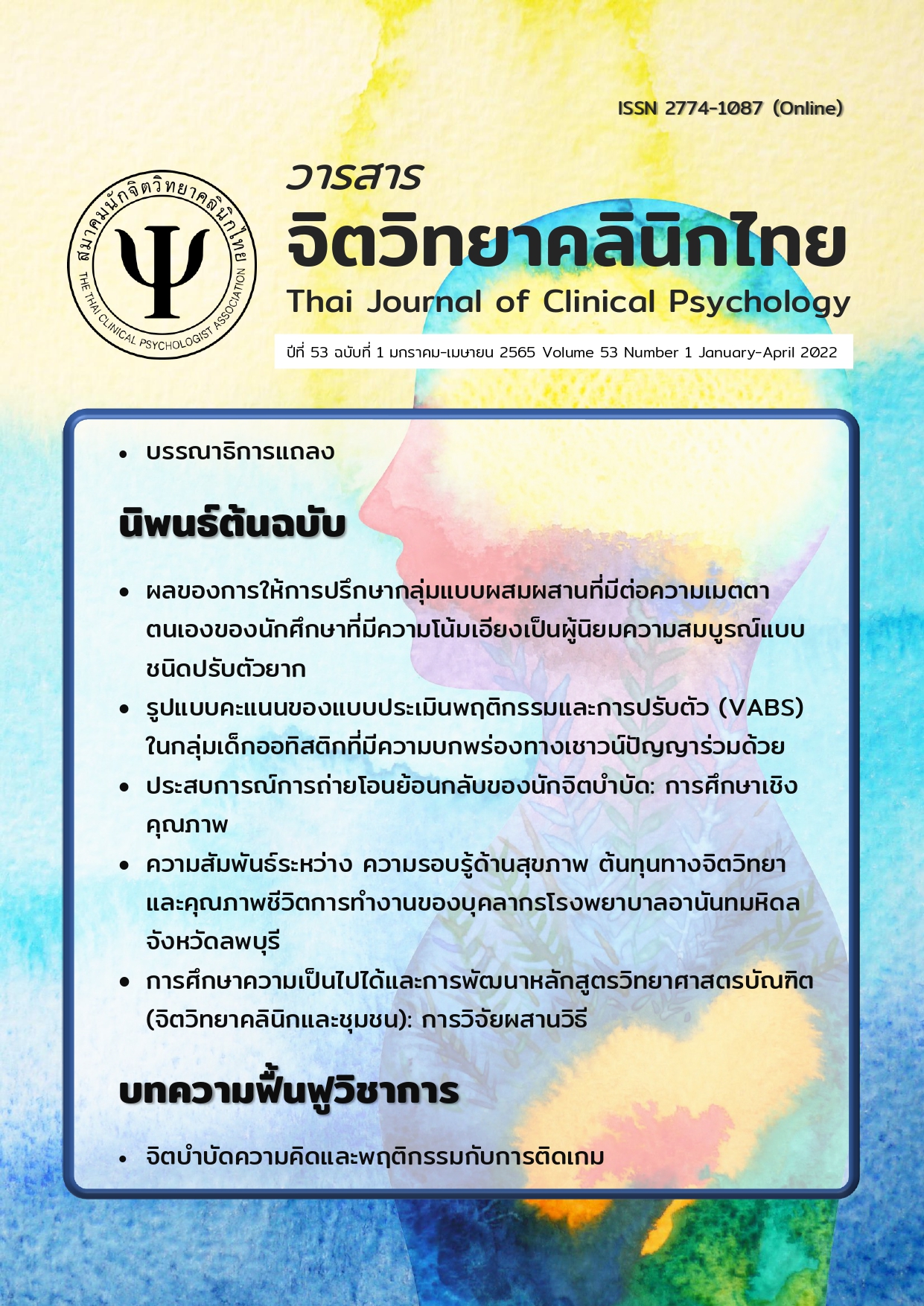The Relationship among Health Literacy, Psychological Capital, and Quality of Work Life of Personnel in Ananda Mahidol Hospital, Lopburi Province
Main Article Content
Abstract
Objectives: To examine the levels of health literacy, psychological capital (PsyCap), and quality of work life (QWL), and the correlation among health literacy, psychological capital, and quality of work life of personnel in Ananda Mahidol Hospital, Lopburi province. Materials and methods: The samples were 304 personnel working in Ananda Mahidol Hospital, who were randomly selected by the proportional sampling method. The research instruments were health literacy and health behaviors 3E 2S, Thai-psychological capital inventory (PsyCap), and the quality of work life questionnaire. Descriptive statistics and Spearman’s correlation coefficients were utilized to analyze data. Results: Overall, the samples had a moderate level of health literacy, a moderate-high level of PsyCap, and a high level of the QWL. Health literacy was found to correlate positively with PsyCap (r=0.32, p<0.01) but displayed a negative correlation with QWL (r=-0.15, p<0.01). PsyCap was positively correlated to QWL (r=0.39; p=<0.01). Conclusion: The findings revealed statistically significant correlations among health literacy, PsyCap, and QWL.
Article Details

This work is licensed under a Creative Commons Attribution-NonCommercial-NoDerivatives 4.0 International License.
เรื่องที่ลงตีพิมพ์ในวารสารจิตวิทยาคลินิกแล้วถือเป็นลิขสิทธิ์การเผยแพร่โดยวารสารจิตวิทยาคลินิกแต่เพียงผู้เดียว การตีพิมพ์หรือเผยแพร่ซ้ำในที่อื่นต้องได้รับอนุญาตจากกองบรรณาธิการวารสารฯ
References
Ananda Mahidol Hospital. (2018). The number of personnel in Ananda Mahidol Hospital (As of February 1st, 2018). [Unpublished manuscript]. Ananda Mahidol Hospital.
Avey, J. B., Reichard, R. J., Luthans, F., & Mhatre, K. H. (2011). Meta–analysis of the impact of positive psychological capital on employee attitudes, behaviors, and performance. Human Resource Development, 22(2), 127–152.
Choocheep, K. (2008). Quality of work life of the civil servants in the southernmost provinces of Thailand. National Institute of Development Administration. (in Thai).
Hackman, J. R. & Sutte, L. J. (1977). Improving life at work: Behavioral science approaches to organizational change. Goodyear Publishing.
Health Education Division, Department of Health Service Support, Ministry of Public Health. (2016). Enhancement and assessment health literacy and health behaviors among school-age group and working-age group. New Thammada Press (Thailand) CO., LTD. (in Thai).
Israel, G. D. (June 2013). Determining sample size. University of Florida. https://edis.ifas.ufl.edu/pd006
Kangsanan, K. & Klinhom, V. (2017). Quality of life of registered nurses in community hospitals zone 1 Nakhon Si Thammarat province. WMS Journal of Management Walailak University, 6(2), 72-82. (in Thai).
Khoshnudi, M., Safari, A., Vahedian-Shahroodi, M., Sadeghnejhad, H., Nejati Parvaz, N. (2019). The relationship between health literacy and quality of life in nurses of hospitals of Kashmar in 2018. Journal of Health Literacy, 4(1), 9-17.
Khumthong, T., Potisiri, W., & Kaedumkoeng, K. (2016). Factors influencing health literacy for people at risk of diabetes mellitus and hypertension of Uthai Thani and Ang Thong. Veridian E-journal Science and Technology Silpakorn University, 3(6), 67-85. (in Thai).
Krasikova, D. V., Lester, P. B., & Harms, P. D. (2015). Effects of psychological capital on mental health and substance abuse. Journal of Leadership & Organizational Studies, 22(3), 280–291.
Luthans, F., & Youssef, C. M. (2007). Emerging positive organizational behavior. Journal of Management, 33, 321–349.
Luthans, F., Avolio, B. J., Walumbwa, F. O., & Li, W. (2005). The psychological capital of Chinese workers: Exploring the relationship with performance. Management and Organization Review, 1(02), 249–271.
Luthans, F., Luthans, K. W., & Luthans, B. C. (2004). Positive psychological capital: Beyond human and social capital. Business Horizons, 47(1), 45–50.
Luthans, F., Youssef C.M. & Avolio B.J. (2007). Psychological capital: Developing the human competitive edge. Oxford University Press.
Nguyen, T. D., & Nguyen, T. T. M. (2011). Psychological capital, quality of work life, and quality of life of marketers: Evidence from Vietnam. Journal of Macromarketing, 32(1), 87–95.
Scheier, M. F., & Carver, C. S. (1985). Optimism, coping, and health: Assessment and implications of generalized outcome expectancies. Health Psychology, 4, 219–247.
Seangsuwan, A. (2013). Relationship between of transformational leadership, psychological capitals, morale and intention to stay mediated by happiness at work of the state enterprise employees. [Unpublished master’s thesis] Thammasat University. (in Thai).
Seligman. (1998). Learned optimism. Simon & Schuster.
Srikuankaew, A., Jiawiwatkul, A., & Thayansin, S. (2018). The relationship between happiness, health literacy and quality of life of elderly: A case study in Wiang elderly school, Fang district, Chiang Mai province. MFU Connexion: Journal of Humanities and Social Sciences, 7(2), 76-95. (in Thai).
Suksangthong, B. (2012). Factors related to quality of working life of temporary staff nurses in hospitals under the jurisdiction of the royal Thai army. EAU Heritage Journal Science and Technology, 6(1), 133-139. (in Thai).
Tajama, B. (2012). Factors affected to quality of work life among staff at Bumrungrad International hospital. [Unpublished master’s thesis]. Mahidol University. (in Thai).
Taylor, S. E., Kemeny, M. E., Reed, G. M., Bower, J. E., & Gruenewald, T. L. (2000). Psychological resources, positive illusions, and health. American Psychologist, 55(1), 99–109.
The World Health Organization quality of life assessment (WHOQOL): Position paper from the World Health Organization. (1995). Social Science & Medicine, 41(10), 1403–1409.
Tho, N. D. (2017). A configurational role of human capital resources in the quality of work life of marketers: FsQCA and SEM findings from Vietnam. Applied Research in Quality of Life, 13(2), 461–478.
Tuntatead, H., Phattharayuttawat, S., & Manusirivithaya, V. (2014). The development of Thai-Psychological Capital Inventory. The Journal of ThePsychiatric Association of Thailand, 59(1), 73-83. (in Thai).
Wanlaeh, W. (2015). Personal Quality of work life in Hatyai Hospital, Hat Yai District, Songkhla Province. (Unpublishd master’s thesis). Hatyai University. (in Thai).


